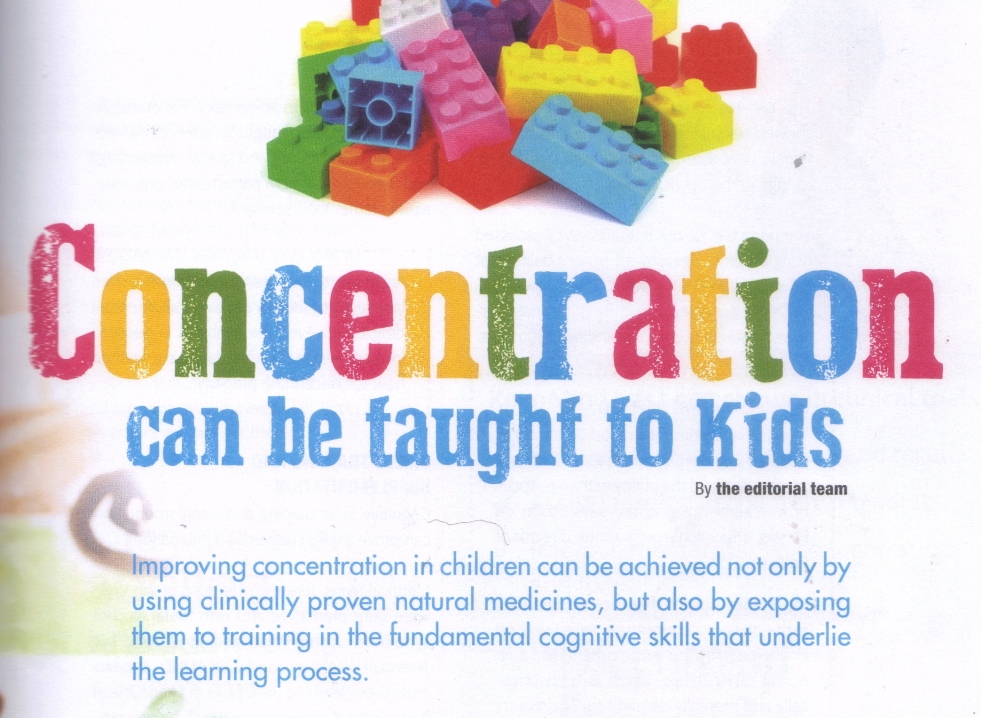
The article below appeared in the July 2015 issue of Natural Medicine:
Research conducted in Singapore in 2014 and analysed by the Centre for Evaluation and Assessment at the University of Pretoria has shown that concentration in children may be achieved naturally without the administration of a pharmaceutical drug. The study measured the improvement in cognitive skills of 27 English-speaking schoolchildren in Singapore, aged 10 to 12, after they had attended a condensed 15-hour, five-day training programme in cognitive skills compiled by the South African reading and learning clinic, Edublox.
THE STUDY – BEFORE AND AFTER
Sponsored by natural medicines company, Flordis SA, the study tracked the performance of 27 learners before and after they had completed the intensive cognitive training programme. Their results were compared with those of a control group of 25 children of the same age, who also participated in the pre- and post-performance tests, but without exposure to the training in between.
The test results of the 27 trained students showed a significant improvement in concentration, or focused attention, with virtually no change in the control group.
The participants’ concentration was assessed using a Cambridge Brain Sciences online test called ‘Feature Match’ which rated how quickly they were able to identify between a series of complex and similar images.
CONCENTRATION DEFINED
‘Everything children learn and do at school requires sustained concentration of at least 20 minutes, and the ability to then re-focus on the same thing again,’ says Susan du Plessis, educational programme director of Edublox.
Du Plessis explains that focused attention is the ability to concentrate selectively on one aspect of the environment while ignoring other things, which is both physically and mentally demanding. This is very challenging for children with problems like Attention Deficit Disorder (ADD).
To master reading and spelling, children must learn the foundational cognitive skills of perception, memory and logical thinking.
How the children were trained
The Singapore learners’ concentration and cognitive skills were fine-tuned via a mix of computer-based exercises, tutor-based training in small groups, and application in the form of reading and written exercises.
Exercises often required the learners to practise more than one cognitive skill simultaneously. For example, learning to replicate a sequence of different coloured blocks after they had been removed built spatial and visual memory skills, as well as concentration.
Skills training was multi-sensory. For example, students were also taught to listen to instructions regarding colour and spatial sequencing, and then to replicate a pattern after only visualising, rather than seeing it.
According to Du Plessis, ‘Children are often labelled erroneously as having an attention deficit. However, the problem is resolved in many instances after they have learned how to concentrate properly.’
SKILLS TRAINING AND SUPPLEMENTATION
Cognitive skills training and supplementation can prove to be a powerful combination.
Identical twins, Jeremiah and Joshua van Wyk, were born premature and with foetal alcohol syndrome. Joshua managed at school, but Jeremiah was diagnosed with ADHD, dyslexia and severe learning disabilities in Grade 2 and had to repeat the year after which he was promoted to Grade 3 with support. Both boys, however, made impressive progress during their primary school years following both training and cognitive skills and supplementation with nutrients.
The boys’ foster mother, Lameez Armien, resisted putting them on medication and refused to send Jeremiah to a special needs school. Instead the twins started the Edublox programme in July 2010 and by December Jeremiah’s school teacher reported that his concentration, reading and handwriting had improved. Although his grades were still very low, he continued doing extra lessons at Edublox with Joshua for two and a half years, with his concentration, memory span and reading having improved significantly by the time they completed the course. Both boys achieved Bs and Cs in several subjects in their Grade 7 reports. Armien attributes this phenomenal achievement to the cognitive skills training they received.
Both boys take omega-3 and 6 daily. Jeremiah has been using KeenMind (Bacopa monnieri) for the past two years and says that it improved his concentration from day one. Joshua believes he has benefited from using BioStrath.
Jeremiah’s success is also due to Armien’s positive attitude. She would always tell him: ‘You are clever and you will get there!’
WHY IS BAD CONCENTRATION SO WIDESPREAD?
‘The South African education system no longer includes training in the critical foundational skills – even at Grade One level,’ Du Plessis says.
Both Du Plessis and Alan Yip, founder of the Singapore Mind Edge Academy concur that concentration is challenged globally by multimedia distractions like television, electronic gaming and smartphone usage.
‘With electronic media, children no longer have to use their imaginations, or remember what happened in a radio episode the day before,’ Du Plessis elaborates. ‘Fewer parents read to their children and so they have also lost out on the opportunity to memorise the words of stories and nursery rhymes being read over and over to them.’
HOW LONG DOES COGNITIVE SKILLS TRAINING TAKE?
At Edublox, 30 to 40 hours of tuition places a learner on a higher cognitive level. Optimising reading, spelling and mathematical performance can take anything from 60 to 210 hours of additional training, depending on the level of difficulty experienced by the child.
Usually one class per week, combined with homework of a few minutes per day, is recommended. Classes take place after school and are 1,5 hours long.
Du Plessis believes that allopathic medication for ADD should be considered by parents in consultation with appropriate treating professionals only after training in foundational cognitive skills has taken place and clinically natural medicines have been tried.
Edublox has received positive feedback from parents who have used Bacopa monnieri for their children.
View further case studies on the improvement in children’s concentration and school performance after cognitive skills training at: www.edublox.co.za.
CONCENTRATION TIPS
Mind Edge founder, Alan Yip, shares some basic concentration tips:
Staying focused during homework or exam preparation
• Tackle the most challenging projects when you are at your peak level of alertness.
• Be positive and tell yourself that you can manage the assignment.
• Ideally study alone, so other people won’t interrupt your concentration.
• Get into the right frame of mind. Put all your worries and distractions aside, perhaps by writing them down as a list for later consideration.
• Cut out external distractions like the TV or radio playing in the background. Put your cell phone away.
• Plan what you are going to do before studying. Research shows that this alone can boost your concentration by 200 to 400%.
• Have clear, concrete goals – for example, how many sums, or pages of history you are going to learn.
• Study for 30 to 40 minutes.
• Before you switch to the next subject, read just one more page. It’s like doing one more bench press to improve and push your concentration to its maximum limit.
Train your child to concentrate
Train your child to concentrate by doing the following exercises, first for just a minute, and then for slightly longer periods of time:
• Close your eyes. Visualise a clear picture of an object like an apple. Hold it still in your mind counting from 30 backwards to one.
• Use an inspiring word or phrase like “I can do it!” or “Success” and repeat it in your head for one to five minutes. This helps to build endurance and the muscle of concentration.
• Get your child to count the number of words or punctuation marks in a passage. Then get her to count at a higher level by only using her eyes, and not her fingers.






Leave a Reply